Google Flights and Google Hotels have dominated travel-related Google search terms in recent years, which has been seen as a threat by many travel operators.
However, if approached properly, the growth of Google Travel represents an opportunity for those who adjust their strategy.
SEO expert Lily Ray shared the Google Travel graph below on a LinkedIn post a few months ago. It only takes a quick glance to see significant month-over-month growth of Google’s/travel/ directory across travel-related search terms.
This is despite the fact, as Lily points out, that Google Travel results don’t appear to be the most comprehensive or helpful, which are presumably key criteria when it comes to organic visibility.
In fact, in many cases, when you search for a city-specific phrase on the main Google Travel page, it simply takes you to a Google search results page for the city, where your search begins anew.
Google-dependent travel companies look at the rapid growth of Google Travel and see one thing: a threat to their existence.
However, remember, Google is not acting as an agent for most of these transactions, so you can still perform and grow online.
You simply need to adapt your strategy and establish your authority, relevance, and experience to give your brand the best opportunity to show up on Google Travel surfaces along with your own pages in organic search results.
We’re going to assess four specific travel surfaces: Google Flights, Google Hotels, Google Vacation Rentals, and Google Explore. We’ll unpack the following for each one.
- Google Travel structure and appearance in Search.
- Who’s currently winning with Google Travel.
- Optimizing to appear in Google Travel spaces.
Note: There is one other surface, Google Things To Do, which is currently only available as a Google Ads product, but did live until November 2023 under the Google Travel page. From an SEO perspective, “Things To Do” can be found as a list of things to discover within Google Explore. We’ll touch on this further when discussing how to optimize for this surface.
Understanding Google Travel’s Structure
In case it wasn’t clear from the graph above, Google Travel is huge. And by huge, I mean huge.
There are effectively two levels to Google Travel when it comes to organic search.
1. Google Travel SERP (Search Engine Results Page) Features
Google Travel SERP features, which are effectively listings of flights or properties along with location, date, and other feature filters to help searchers choose the best flight, hotel, or vacation rental option to suit their needs.
Typical travel SERP features for flights, hotels, and vacation rentals look like this:
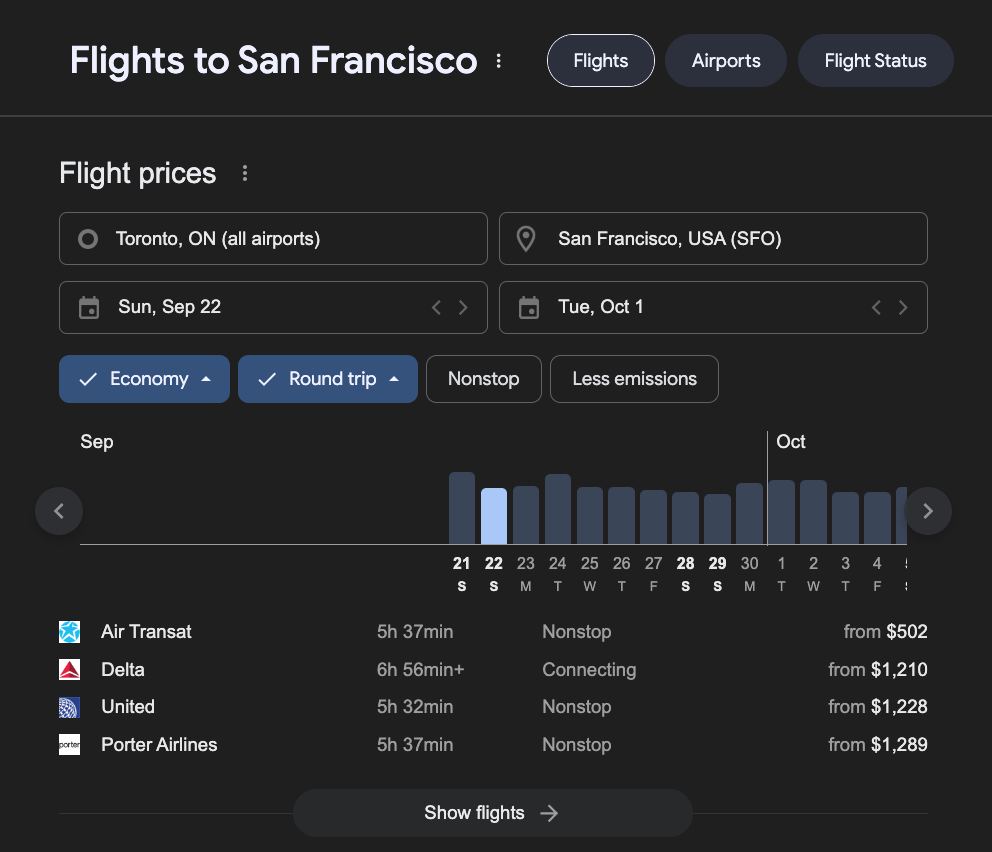 Screenshot from search for [flights to san Francisco], Google, August 2024
Screenshot from search for [flights to san Francisco], Google, August 2024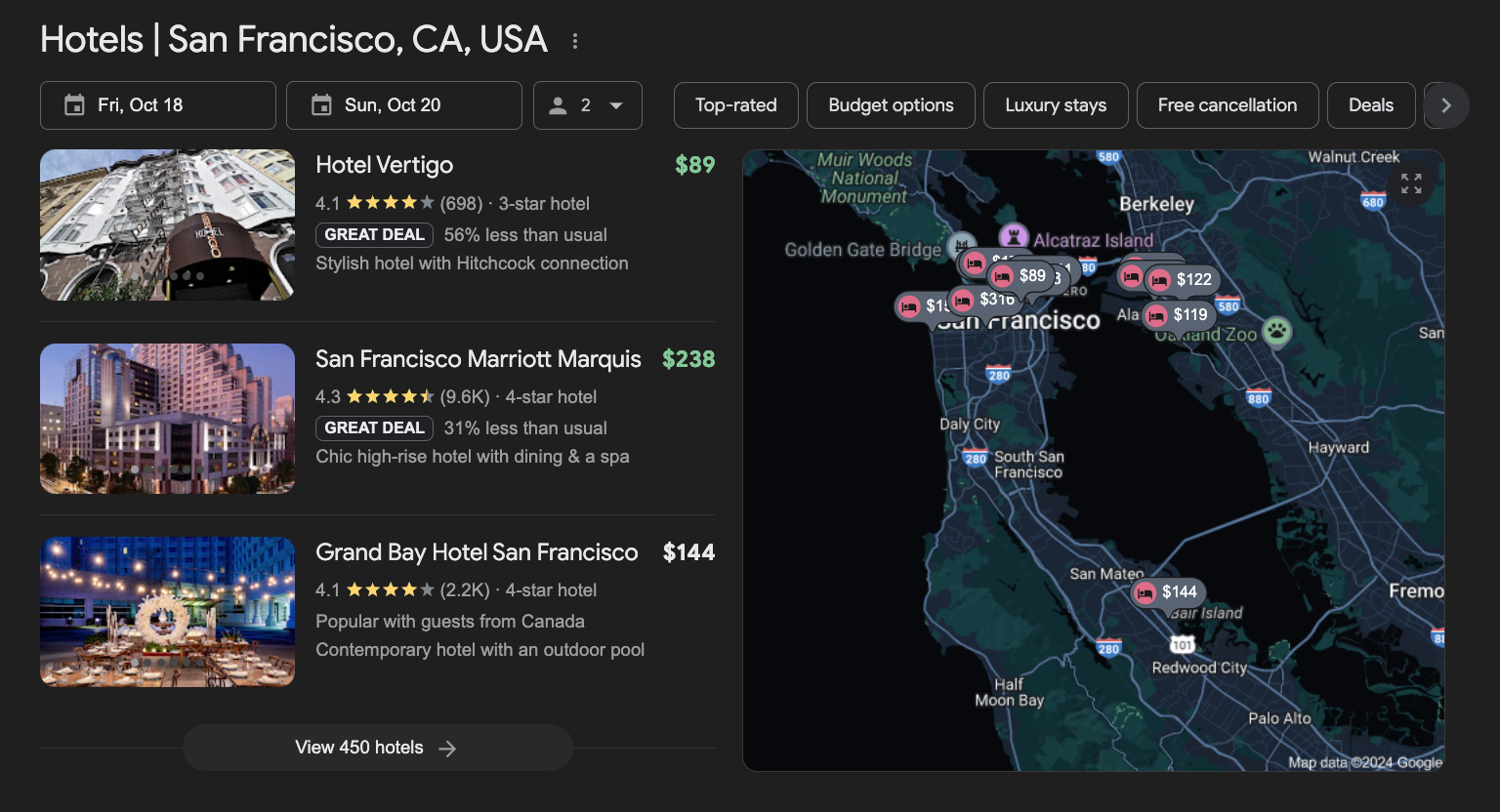 Screenshot from search for [hotels in san francisco], Google, August 2024
Screenshot from search for [hotels in san francisco], Google, August 20242. Google Travel Organic Pages Appearing As Typical Organic Search Engine Results
 Screenshot from search for [cheap flights from austin to san francisco], Google, August 2024
Screenshot from search for [cheap flights from austin to san francisco], Google, August 2024 Screenshot from search for [hotels in san Francisco], Google, August 2024
Screenshot from search for [hotels in san Francisco], Google, August 2024This review will focus on the latter of the two because these are the easiest to measure.
We also assume, in most cases, that when one of the organic results appears, there’s a high likelihood the SERP feature will also appear at the top of the page.
Semrush recognizes over 750,000 Google Travel pages in the U.S. alone.
Assuming Semrush’s crawler won’t crawl and index every single page, it’s very reasonable to assume the actual number of Google Travel pages exceeds 1 million in total.
Google Travel Page Structure And Appearance In Search
The main Google Travel page is pretty bare bones with “Google” as the title tag, one H2 heading labeled “Popular Destination” and a grand total of 124 words.
Not exactly an exercise in SEO best practice, but then again, this page at least does not rank well for the term “travel.”
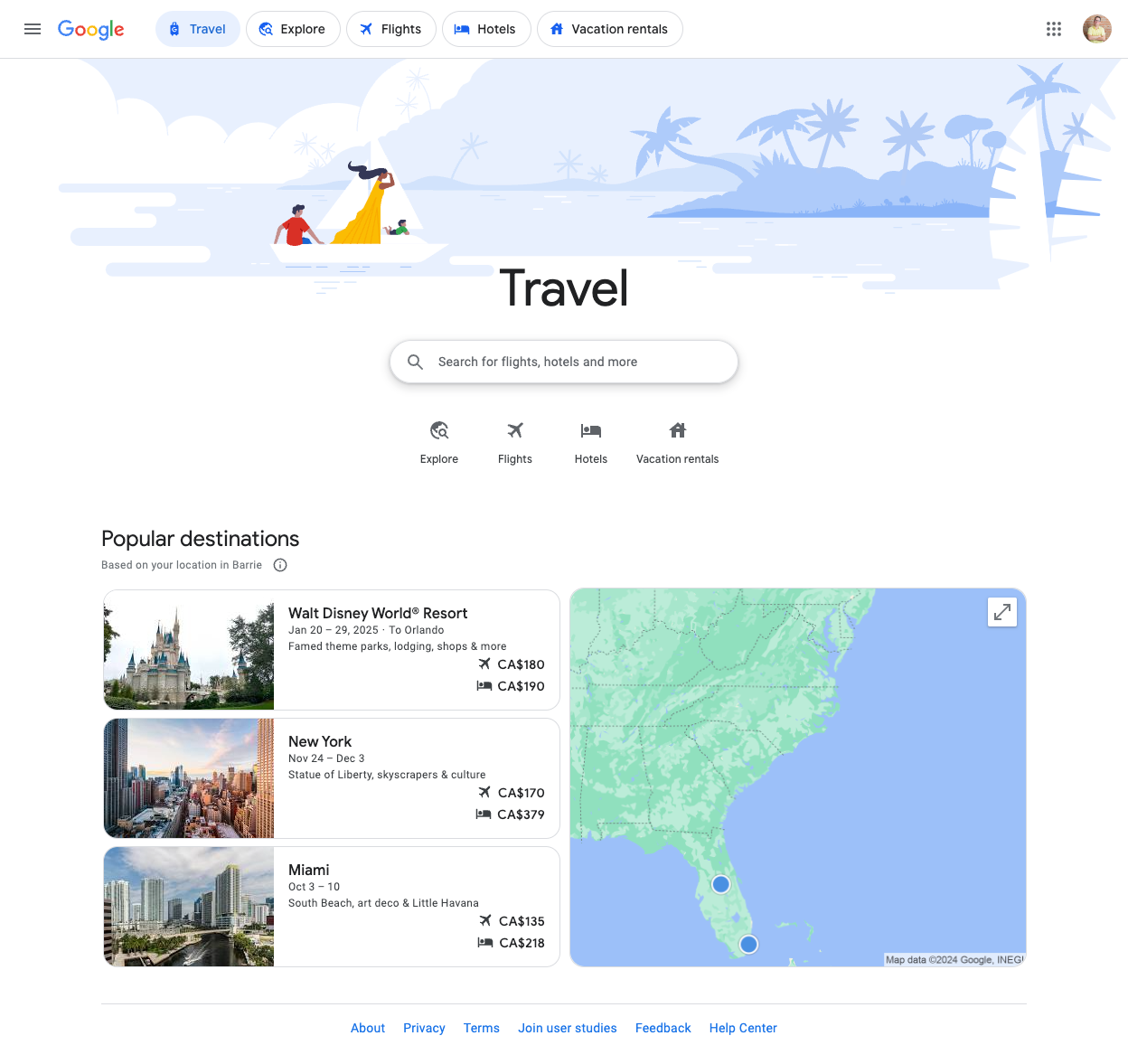 Screenshot from Google Travel Home page, September 2024
Screenshot from Google Travel Home page, September 2024Flights
The Google Flights page, by comparison (at the time of writing), ranks in the top 3 for the terms “travel,” “flights,” and many other high-value keywords.
This page offers a much more robust user experience with flight search, an interactive flight search map, useful tools to find the best deals, FAQs, and links to popular flight departures/destinations.
However, this page is specifically focused on air travel, whereas all other page one results are more holistic in their broader travel offerings.
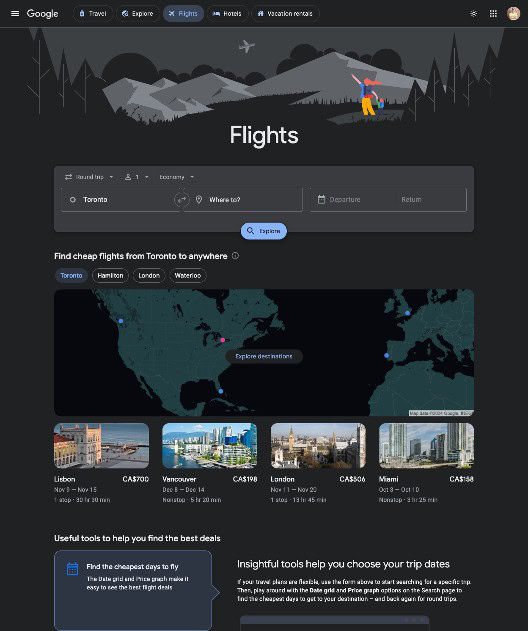 Screenshot from Google Flights Home page, September 2024
Screenshot from Google Flights Home page, September 2024The primary function available on the Google Flights page is a flight search, which, when enabled, provides a short list of the “Best departing flights” (“ranked based on price and convenience”) followed by a much longer list of “Other departing flights.”
It is good to note how best-departing flights are being ranked when it comes to determining how to appear in this list.
There are also opportunities to track prices or compare pricing via a date grid or price graph tied to your selected travel dates.
Hotels
Google no longer appears to have a dedicated Hotels page per se, as google.com/travel/hotels currently redirects to a Google Hotels search page that has a title tag, “Discover Hotels For Your Next Trip – Google Hotels.”
Similarly, there is no Google Vacation Rentals page, but there is a Google Vacation Rentals search page, which has a title tag that is simply “Google Hotel Search.”
Curiously, google.com/travel/vacation-rentals does not currently exist.
As you can see in the screenshot below, Google Travel Hotels are tightly integrated with Google Maps. Filters enable searchers to refine their needs based on price, ratings, stars, amenities, and other factors.
Also note that hotels offering “Deals” are highlighted with green buttons and pricing, and they generally rise to the top of the search results, much like best-departing flights. This is not the case with vacation rentals.
The above are important factors when considering how to optimize for appearance in these search results.
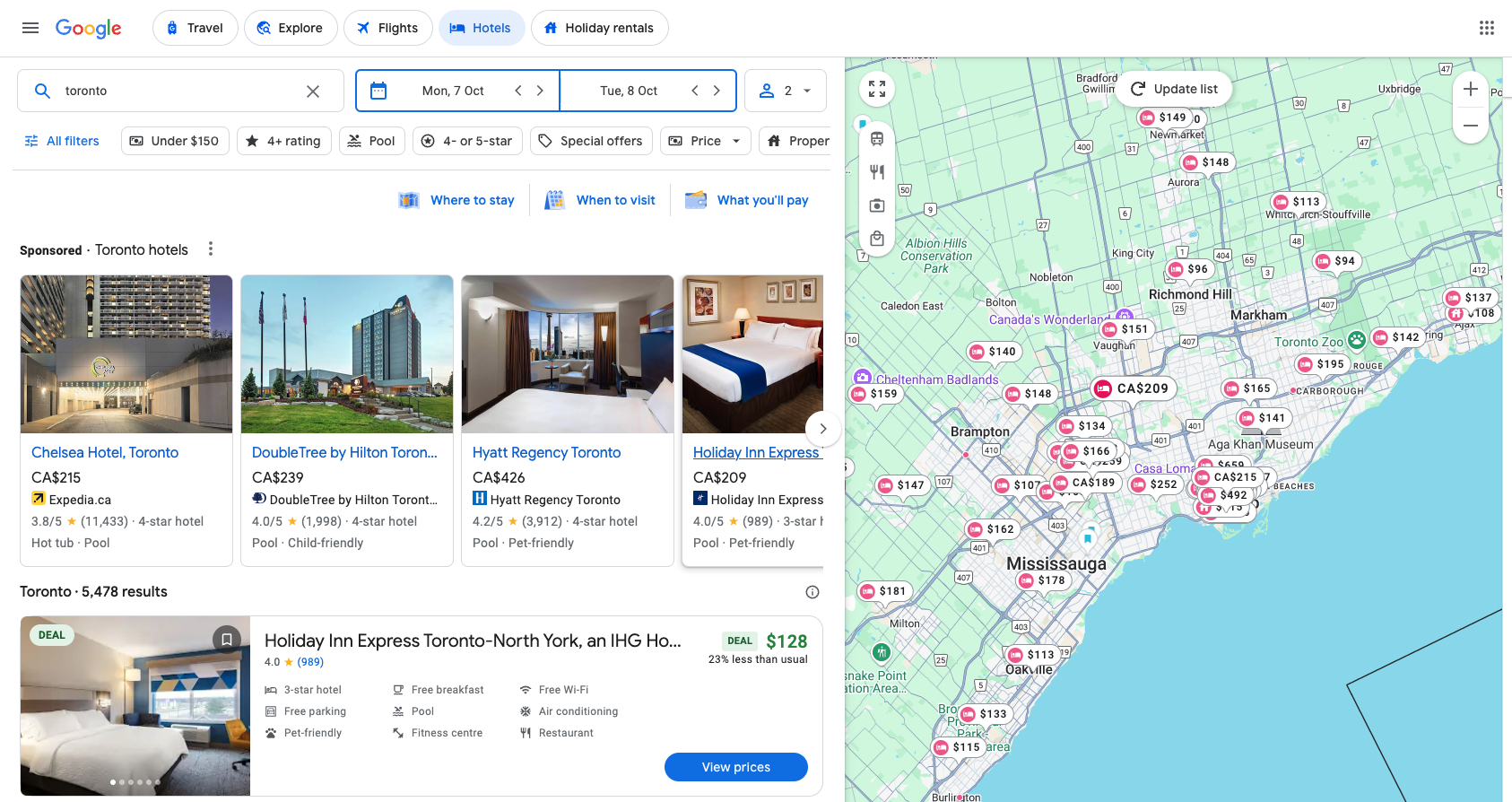 Screenshot from search for [toronto hotels], Google, September 2024
Screenshot from search for [toronto hotels], Google, September 2024Vacation Rentals
Google Vacation Rentals are similar to hotels, displaying a filterable listing of properties alongside an interactive Google Map.
However, searchers are required to click on a result from the list or map, which then provides additional lists of “Booking options” and “Additional results from the web.” Both lists provide booking options, but being found under the actual “booking” category is obviously more valuable.
Each listing includes an Overview, Prices, Reviews, Photos, and About section. The quality and quantity of content contained in each of these undoubtedly factor into how properties are ranked and displayed.
![Google search for [toronto vacation rentals]](https://www.searchenginejournal.com/wp-content/uploads/2024/09/google-vacation-rentals-104.png) Screenshot from search for “toronto vacation rentals”, Google, September 2024
Screenshot from search for “toronto vacation rentals”, Google, September 2024Explore
The last component of Google Travel to consider is Explore.
As the name suggests, Explore is focused on enabling travelers to search for new destinations or look for deals based on their budget and travel dates (important to note for brands keen to be found here).
Explore is effectively a filterable, interactive map displaying thumbnails of potential destinations with flight prices, which, when clicked, extends into a fuller view of ranked things to do, places to stay, flight options, information on when to visit, and questions asked by other travelers.
The title tag for this interactive page is dynamic based on the starting location chosen by the user, e.g., “Toronto to anywhere | Explore.”
As mentioned earlier, things to do/discover appear at the top of an Explore results page.
The “things to do/discover” on Explore appear to be the most popular local places and attractions, which have been optimized from a local SEO perspective. Reviews are front and center here, as they are in the Google Map Pack.
The Help button on Explore indicates, “These destinations are ranked mainly by popularity, and the cost and convenience of travel from your location. Factors include frequency of mentions across the web, destination search queries, travel time, number of stops, and airport changes during layovers.”
It is interesting and important to note the inclusion of “frequency of mentions across the web” as a ranking factor.
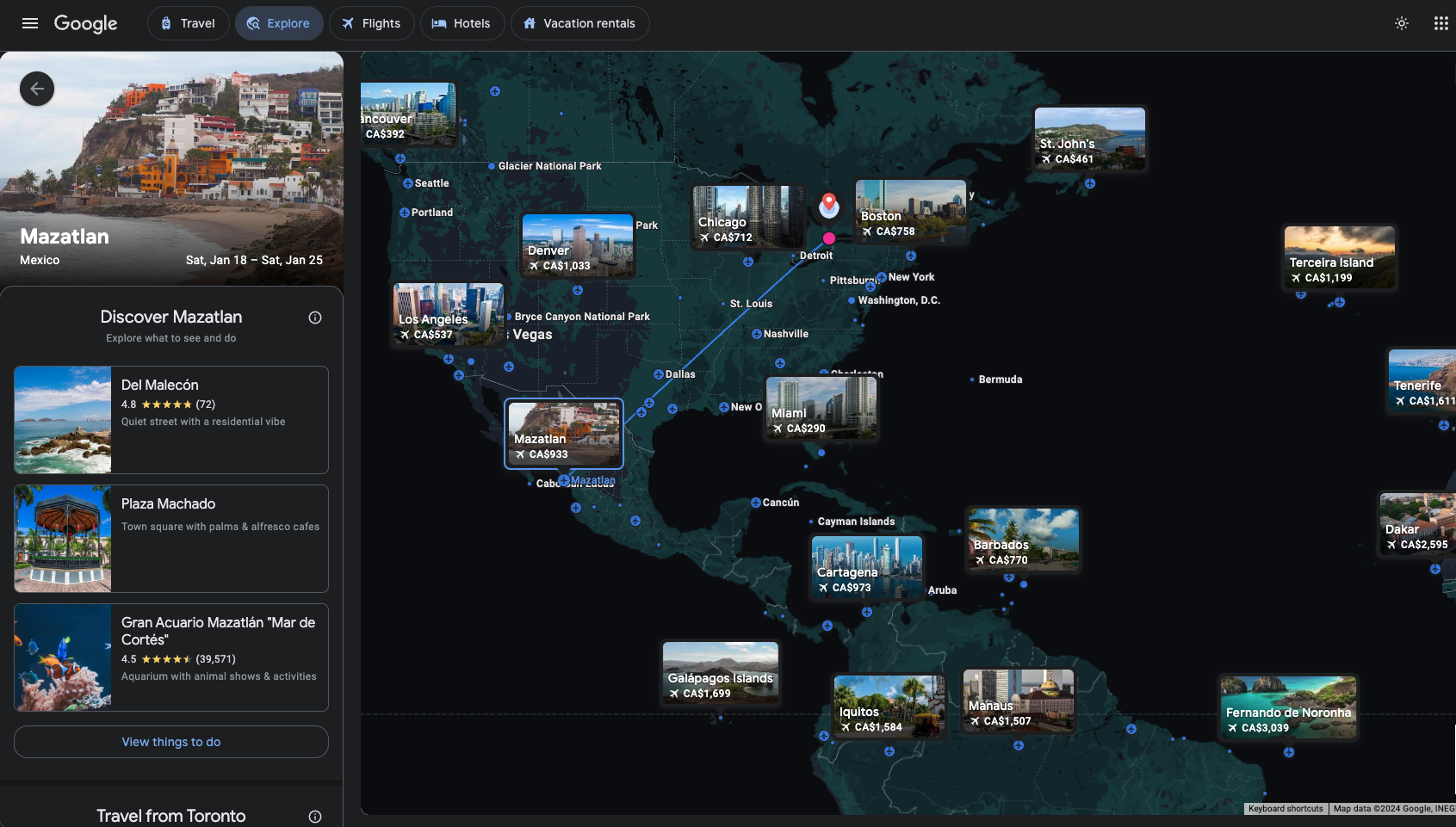 Screenshot from Google Explore Home page, September 2024
Screenshot from Google Explore Home page, September 2024So, Who’s Currently Winning With Google Travel?
While some brands view Google Travel as a threat and with disdain, others see an opportunity and are reaping the benefits of having another highly visible channel through which to access their customers.
As Kevin Indig recently pointed out, large brands have an advantage, as this plays an increasingly significant role in search visibility.
A quick review of Google Travel Spaces reveals the following players managing to gain prominence:
Google Flights
As you’d expect, the major airlines, buoyed by their significant branding and authority, dominate Google Flights.
However, there certainly is an opportunity for lesser-known discount airlines/brands to appear, particularly under best-departing flights where the key driver is price.
Google Hotels
Here, major hotel chains and online travel agents (OTAs) like Expedia and Booking.com rule again.
However, opportunities clearly lie in Google Maps and local SEO, where smaller, local businesses can leverage their “local authority” and gain visibility.
Read on for local SEO strategies and best practices.
Google Vacation Rentals
On the Google Vacation Rentals side, attention should be paid to OTAs like VRBO and Booking.com, which are also highly visible and appear in the Booking Options list mentioned earlier, so property owners certainly should leverage these.
However, there are several other property types of online agents (e.g., glamping, short-term rental) who also appear.
As with hotels, vacation property owners should certainly look to leverage their local standing to garner attention and build authority.
Google Explore
The brands that appear to be winning in Google Explore tend to be those offering deals or popular experiences personalized to the searcher’s location and historical preferences, which plays to the desires of the perceived audience search.
As noted, the things to discover/do appearing in Explore will be the most popular attractions and experiences, which have gained local organic search authority.
Optimizing To Appear In Google Travel Spaces
In light of the organic search visibility, Google Travel spaces are able to achieve, travel brands are well advised to do whatever they can to optimize their web presences to gain visibility in these coveted spaces.
Below are some factors and suggestions for each space, considering how content appears to be prioritized for display in each.
Google Flights
To be clear, to appear on Google Flights, you must first be an airline operator offering flights to consumers.
If you are part of such an organization, these recommendations are for you.
Schema Markup
- Implement flight schema markup on your flight listing pages to provide Google with structured data about your specific flight offerings (i.e., departure/arrival airports, dates, prices, etc.). This will help Google better understand your content and improve your Google Flights results visibility.
Competitive Pricing
- Price is a major factor in Google Flights rankings. Regularly monitor your competitors’ prices and ensure your fares are competitive.
- Consider offering special flight deals or promotions to garner attention for specific flights or destinations.
Landing Page Optimization
- Create dedicated, keyword and user-experience-optimized landing pages for specific flight routes, destinations, or promotions.
- Ensure a clear call-to-action (e.g., “Book Now”) exists, and a straightforward booking process is in place.
Website Technical SEO
- Make sure your website has a solid technical foundation (fast loading times, secure connections, logical page and navigation structure, mobile-friendly design, etc.). Technical issues can negatively impact your overall search visibility.
Google Hotels
Google Business Profile Optimization
- Claim and optimize your Google Business Profile (GBP) to enhance your local authority. Ensure all information is accurate and up-to-date (address, phone number, hours of operation, photos, etc.).
- Encourage guests to leave reviews on your GBP and respond to those reviews in a timely manner. Positive reviews and response rates can help boost your rankings.
- Post content regularly to your GBP to demonstrate your commitment to community and customer engagement.
Hotel Ad Campaigns
- Consider running optimized Google Ads hotel campaigns in concert with your SEO efforts. While not organic in nature, this tactic will enable you to have your hotel’s rates and availability displayed directly in Google search results, on Google Maps, or YouTube. Focus on ads for keywords you do not already maintain high organic rankings for.
Website Optimization
- Optimize your website for relevant keywords, user experience, and conversions.
- Highlight key selling points (amenities, location, unique features) and include high-quality photos and videos.
- Ensure your booking engine is easy to use and mobile-friendly.
- Incorporate a blog or other content marketing device as a means to publish fresh, relevant content linking to your primary product pages.
Local SEO
- Identify and obtain local citations from relevant sources (listings on online directories and review sites). Consistent NAP (Name, Address, Phone number) information across the web is crucial for local SEO.
- Engage with your local community and build relationships with other businesses in your area.
Google Vacation Rentals
Listings On Major Platforms
- Consider listing your vacation rental properties on major OTAs already integrated with Google Vacation Rentals (e.g., Vrbo, Booking).
Optimized Property Descriptions
- Craft compelling and detailed property descriptions highlighting your properties’ unique features and amenities.
- Include relevant keywords in your property descriptions.
High-Quality Photos
- Include professional-quality photos, videos, or virtual tours on your property pages, as these are essential for attracting bookings. Showcase your property in the best light.
- Be careful when adding high-quality image or video content to not negatively affect page load or overall user experience, particularly on mobile devices.
Competitive Pricing and Availability
- Regularly review your pricing strategy and ensure your rates are in line with similar properties in your area.
- Keep your calendar up-to-date and respond promptly to all booking inquiries.
Ask For And Promptly Respond To Reviews
- Reviews are prominently displayed under Vacation Rentals and, as such, should be actively pursued and responded to. These will both factor into rank and will no doubt be referenced when consumers are considering booking a property.
Google Explore
Competitive Pricing
- Ensure your prices are competitive, considering a fair percentage of consumers on Explore are looking for deals. Highlight any promotions or discounts.
Off-Site Optimization
- Google’s inclusion of “frequency of mentions on the web” as a ranking factor in Explore clearly indicates that user-generated content on social media or other external forums like Reddit is being reviewed and referenced.
As such, it will certainly benefit travel brands to be actively engaged with consumers on these platforms.
Consumers of all ages are looking outside of Google to conduct their travel planning and share their experiences. Brands that aren’t monitoring and engaging on these channels are missing out on significant opportunities to extend their reach and build their authority.
Use High-Quality Visuals
- Invest in captivating photos and videos to showcase your destination or property. Consumers on explore are searching for unique, new experiences, so provide content that will catch their eye and imagination.
Create Appealing Destination Descriptions
- Craft enticing descriptions highlighting the unique features your destination or travel experience has to offer, complementing the visuals noted above.
Up-to-Date Information
- Keep your listings updated with accurate pricing and availability, as many consumers may be looking for last-minute travel opportunities.
GBP Optimization For Those Offering Things To Do
- As things to do/discover are effective Google Map Pack results, the same suggestions apply as those mentioned for Hotels.
General SEO Best Practices Across All Platforms
Outside of the Google Travel-specific suggestions above, there are several other general SEO best practices site owners should employ to maximize their authority.
Mobile-First Approach
In today’s mobile-driven environment, which is particularly true for consumers exploring or planning their next travel experience, it is critical to have a site that loads quickly and seamlessly on mobile devices.
Content Marketing
A significant component of establishing online authority is having the answers to all of the questions searchers have regarding any given topic.
With travel planning, questions regarding destinations, transportation, accommodation, scheduling, cost, and other considerations abound.
It is essential for travel brands wanting to establish authority to have unique, helpful answers to all of their audiences’ questions via a content strategy that may take the form of blog posts, guides, videos, photos, podcasts, or other content marketing vehicles.
High Quality, Relevant Backlink Acquisition
Despite ongoing arguments about their validity and value, contextually appropriate backlinks obtained from domains with high authority and high relevance, will have a positive effect on a website’s authority by extension.
Travel brands looking to increase their authority should endeavor to establish strong partnerships, conduct digital PR, and obtain high-value backlinks from such sources.
What’s Next For Google Travel?
SEO is ever-changing, and this will be no different from what Google Travel is concerned with. Google AI Overviews have been rolled out in full and are being returned in search results across a number of categories.
They are not currently highly prevalent in travel, but there is no doubt AI is already part of the travel search experience. Something like AI Overviews, where searchers can interact with results to build their ideal trip plan more naturally, is coming.
Google Explore is already an interactive experience, and I’m fairly certain this will continue to evolve, powered by AI.
The good news on this front, as per a recent SEO Clarity research study, is SEO for AI Overviews is, at this point, very much the same as traditional SEO.
This study reveals in the top ranking, organic search results and sites/content make up the bulk (~99%) of what’s presented by AI Overviews.
Your Google Travel SEO Plan
The impact and dominance of Google Travel in organic search results is undeniable.
The question becomes, how do savvy travel marketers take advantage of, rather than shy away from, the challenge of being found in Google Travel spaces?
The focus, from an SEO perspective, should be on many of the traditional SEO and local SEO best practices aimed at establishing authority and trust among consumers, as prescribed in the past.
More resources:
Featured Image: PeopleImages.com – Yuri A/Shutterstock

